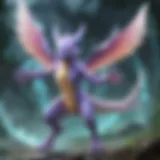Arceus and the Evolution of Pokémon Legends
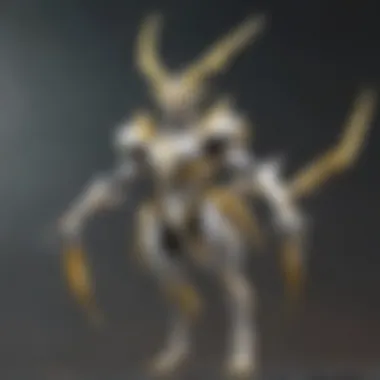

Intro
In the sprawling universe of Pokémon, few figures stand out as markedly as Arceus, often revered as the Original One. A being of immense power and the supposed creator of the Pokémon world, Arceus has a story that intertwines with the evolution of the franchise over the years. This article endeavors to dissect the multiple layers that define Arceus, placing it against the backdrop of Pokémon legends, to explore how this character reflects broader themes in Pokémon mythology and gameplay.
As we delve deeper, we will unpack how Arceus reshapes the very fabric of Pokémon lore, functions within the gameplay sphere, and how its presence has influenced the design of other characters throughout various game installments. By the end, readers will be well-versed in not only Arceus’s contributions but also its significance in the grand narrative of Pokémon.
Pokemon Game Overview
History of Pokemon games
The Pokémon franchise launched with the release of Pokémon Red and Green in Japan in 1996 and has steadily evolved into a multimedia powerhouse. Over the years, it has adapted to shifts in technology and player expectations, culminating in a myriad of games spanning handheld devices, consoles, and even mobile platforms.
The adventure started with a simple idea: catch them all. However, this idea has transformed dramatically, leading to complex narratives, diverse gameplay mechanics, and rich character development that not only focuses on catching Pokémon but also on battling, trading, and interacting within a vibrant community.
Evolution of gameplay mechanics
With each new game release, gameplay mechanics have seen an impressive evolution:
- Turn-Based Battles: Initially simple, battles have evolved to incorporate myriad strategies and additional elements like abilities and types.
- Open World Exploration: Recent titles like Pokémon Legends: Arceus have introduced vast, open-world environments, allowing players to explore and discover Pokémon in a more natural setting, reflecting a significant shift from linear progression.
- Dynamic Interactions: Pokémon now interact in ways that affect battles and environments; players can now use various tactics to influence their approach to catching and battling Pokémon.
Intro to different game versions
The Pokémon franchise is synonymous with innovation and iteration. Each core series title introduces a unique flair while retaining essential elements from its predecessors. Standout versions have included:
- Pokémon Sun and Moon: Introduced Alolan forms, reshaping familiar Pokémon into new variants, which stirred fans – such as the Ghost/Ground-type Marowak.
- Pokémon Sword and Shield: This duo offered expansive wild areas, along with Max Raid Battles that changed the multiplayer schema.
- Pokémon Legends: Arceus: Emphasizing exploration and lore, this title presents Arceus in a new light, altering the traditional Pokémon gameplay format, bringing rich narrative depth.
These developments represent not only gameplay advancements but also a reflection of the community’s desires and expectations, creating a profound connection between the games and their players.
Understanding these shifts is essential to grasping Arceus's monumental relevance in the Pokémon universe; it encapsulates not just a powerful entity within the lore but also represents the franchise’s ongoing evolution.
By examining the various aspects of gameplay, lore, and character significance, it’s clear that Arceus plays a pivotal role in the overarching narrative of Pokémon.
Next Steps
With a solid foundation on the historical context of Pokémon games established, it’s crucial to look specifically at Arceus in the context of gameplay strategies and character analysis, shedding light on how players can optimize their experience with this legendary Pokémon.
Intro to Arceus
In the vast tapestry of the Pokémon universe, Arceus stands as a monumental figure, embodying themes of creation and existence itself. The introduction of this legendary Pokémon isn’t merely an introduction to another character; it serves as an in-depth exploration of fundamental concepts that resonate throughout Pokémon lore. Arceus's significance cannot be overstated, as it is credited with the very foundation of the Pokémon world, making it a pivotal character in understanding Pokémons' evolution.
By examining Arceus, players and fans can appreciate the intricate lore that goes beyond just gameplay. Not only does it symbolize divinity, but it also encapsulates the shifting dynamics of power and balance within the Pokémon universe. In this narrative, we aim to highlight several specific elements central to Arceus: its origin, its vast abilities in battle, and the essential role it plays in the greater context of Pokémon mythology. Each of these aspects offers fans insight into the design and narrative intentions behind Arceus, ensuring a richer experience as they navigate through games and engage with the franchise.
The connection between Arceus and the concept of legendary Pokémon is also vital. Ignoring Arceus would be akin to overlooking the architect behind the grand design of a sprawling universe; it is the keystone to both the narrative and gameplay mechanics that have shaped players’ experiences. As we delve further into its backstory and abilities, it becomes clear why Arceus is not just a collectible figure in a game, but a symbol of ambition, creativity, and the philosophical underpinnings shaping Pokémon’s evolutionary journey.
The Origin and Backstory of Arceus
Arceus, often referred to as the "Original One," carries with it an origin story that intertwines with the very birth of the cosmos in Pokémon lore. This Pokémon is said to have emerged from an egg that rested in a void before time began. There’s a mystical allure in the belief that Arceus created the Pokémon universe, calling forth the elements and bringing forth the first beings, Dialga and Palkia, who oversee time and space, respectively. Its introduction in Pokémon Diamond and Pearl fueled speculation and discussion among the community regarding the interconnectedness of the creation myth within the series.
The backstory of Arceus draws parallels to various mythologies outside of Pokémon, potentially echoing similar themes found in creation stories worldwide. It raises questions—was Arceus's purpose solely to create, or did it play an active role in shaping the universe’s philosophy? Subsequently, the Pokémon universe began to expand, leading to a plethora of other legendary beings that further built upon the foundation laid by Arceus.
Key Attributes and Abilities
What sets Arceus apart are its unique abilities and attributes, providing it with a versatile edge in both lore and competitive play. Its classification as a Normal-type Pokémon can be misleading; its true strength lies in its multitype ability, which allows it to change its type based on the Plate or Z-Crystal it holds. This adaptability makes it a particularly formidable opponent.
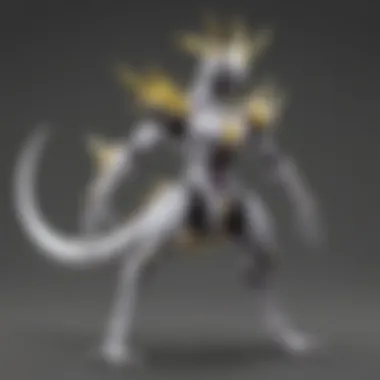

In battles, Arceus boasts exceptionally balanced stats, with an impressive base stat total of 720, allowing it to hold its own against other legends such as Mewtwo and Rayquaza. Some of its notable moves include Judgment, which is a powerful special attack that varies based on Arceus’s type, and Recover, enabling it to heal and prolong its presence in battle.
Arceus represents the peak of Pokémon evolution, illustrating how balancing attributes and strategic tactics can influence competitive play.
The Role of Arceus in Pokémon Lore
Arceus serves not only as a character within the games but as a representation of the overarching narrative arcs that define Pokémon. In many ways, Arceus reflects philosophical discussions about creation, morality, and the very essence of life within the Pokémon world. Its interactions with other legendary Pokémon further exemplify its role as a custodian of balance.
For example, in the events of the Pokémon Legends: Arceus game, the storyline intricately weaves Arceus into the very fabric of the game’s quests, emphasizing its role as a guiding force. Through various quests, players are introduced to various artifacts and themes surrounding creation and evolution. These narratives not only serve to enhance gameplay but also highlight Arceus's significance in relation to other legendary Pokémon, reinforcing its status as a progenitor of the Pokémon universe.
The examination of Arceus not only lays the groundwork for understanding its role but also opens the door for deeper explorations into the interconnected universe of Pokémon, showing us that while the battles may be fierce, the lore is rich and profound.
Understanding Legendary Pokémon
The realm of Pokémon features an array of figures and beings, among which legendary Pokémon stand apart like stars in a night sky. They hold not just immense power but also a weighty significance in the series' narrative tapestry. Understanding legendary Pokémon is crucial in appreciating the broader mythos of the Pokémon universe, particularly when examining characters like Arceus.
Legendary Pokémon usually embody themes of creation, destruction, balance, or other fundamental concepts. They often play pivotal roles in the lore, influencing the course of events not only in their respective regions but also across the entire Pokémon world. These Pokémon are often limited in availability within the games, designing an air of mystique that adds depth to their characteristics and interactions. For fans, encountering and capturing these creatures is akin to discovering hidden treasure amid a vast landscape.
Defining Legendary Pokémon in the Series
In the Pokémon series, legendary Pokémon are more than just formidable opponents. They frequently represent key elements of the Pokémon world. Most notably, each generation introduces new legendaries, contributing to the ever-expanding lore. For example, Mewtwo represents genetic manipulation, while Lugia and Ho-Oh symbolize guardianship over the seas and skies, respectively.
While definitions may vary, several characteristics commonly identify legendary Pokémon:
- Rarity: They typically appear only once in the game or in specific locations, setting them apart from common Pokémon.
- Unique Abilities: Many feature abilities that can alter battle dynamics significantly, making them highly desirable for competitive play.
- Significance in Lore: Most have a backstory that ties into the game’s mythology, enhancing players’ emotional connection.
Such attributes not only elevate the gameplay experience but also encourage players to explore the lore, adding an element of storytelling beyond just capturing Pokémon.
The Concept of Divinity in Pokémon
Diving further, the concept of divinity emerges as a crucial element in distinguishing legendary Pokémon. Arceus often takes center stage in these discussions, perceived as the very creator within the Pokémon universe. This characterization raises intriguing questions about godhood and morality in the context of its powers.
Several legends hint that certain Pokémon maintain cosmic powers, controlling various elements of the world. For instance, Dialga governs time while Palkia oversees space. The interplay among these beings crafts a narrative that blurs the lines between mythology and reality, almost resembling ancient myths surrounding deities in various cultures.
Notably, in many mythologies, beings with such qualities often interact with less powerful entities, sometimes guiding them or creating conflicts. In Pokémon, legendary creatures frequently influence the destinies of other Pokémon and trainers alike, suggesting a divine hierarchy. This interplay naturally invites discussions about fate, morality, and the ethical implications of wielding such power.
"Legendary Pokémon symbolize not just strength, but a connection to the very essence of existence within the Pokémon universe."
Their presence not only enriches gameplay but also engages players on a philosophical level, making the experience more than just a quest for badges and Pokémon. This foundation sets the stage for exploring how Arceus interacts with other legendary creatures and the implications of its divine attributes.
Gameplay Mechanics Involving Arceus
Understanding how Arceus operates within the gameplay mechanics of the Pokémon series is essential for any player wanting to leverage its power effectively. Not only does Arceus stand out due to its legendary status, but its intricate design allows for various strategies that can make or break competitive battles. Let's dive deeper into the specific elements that benefit gameplay involving Arceus, considerations for its use, and its overall impact.
Arceus in Competitive Play
In the competitive sphere, Arceus is often compared to a double-edged sword. On one hand, it boasts versatility that’s second to none; on the other, its balance can become tricky to master. Given its type-changing ability known as Multitype, Arceus can shift into any one of its eighteen types depending on the Plate or Z-Crystal it holds. This flexibility allows players to adapt their Arceus to counter opponents, making it a wildcard in competitive environments.
Moreover, Arceus's base stats are compelling, with equal distribution across Attack, Defense, Special Attack, Special Defense, and Speed. This balanced stat spread means that players can craft a myriad of builds focusing on different play styles:
- Tanky Variants: Focus on bulk and support moves such as Recover.
- Offensive Setups: Emphasizing high-damage moves like Judgment or Searing Shot.
- Support Roles: Utilizing moves like Stealth Rock and Thunder Wave to control the battlefield.
The Impact of Arceus's Unique Abilities
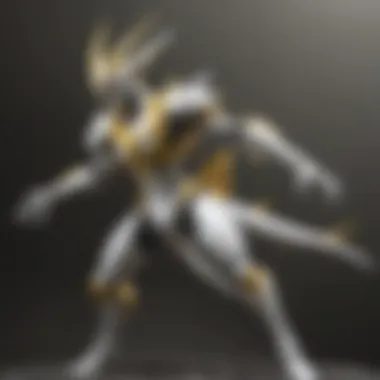

Arceus's abilities truly set the character apart in the Pokémon universe. Its ability to change type is not merely a gimmick; it alters the course of play fundamentally. Allowing players to capitalize on specific weaknesses in their opponents’ teams is vital. A key consideration here is the crucial role of Stats and Type-Matchups.
For instance, an Arceus decked out with a Fairy Plate can dramatically shift the fight against a Dragon-type team, taking advantage of type weaknesses. Furthermore, with the introduction of moves like Will-O-Wisp and Toxic, Arceus can wear down opponents, making it not just an attacker but a nuisance as well.
"The versatility of Arceus in competitive play is both a strength and a juggling act that demands precise adjustments."
Strategies for Utilizing Arceus Effectively
Maximizing the potential of Arceus in battles requires a strategic mindset. Here are several strategies that can help players use Arceus to the fullest:
- Plate Selection: Choosing the correct Plate critical to team performance. The variance from Steel-type Arceus's Iron Head coverage to the damage from Ghost-type's Shadow Force can swing a battle.
- Speed Control: The move Extreme Speed can help in outspeeding threats, making it a reliable choice for finishing off injured opponents.
- Balancing Offensive and Defensive Moves: Pairing Arceus's offensive capabilities with support moves allows it to perform dual roles during battles.
- Anticipating Opponent Moves: Given Arceus's unpredictable nature, opponents may hesitate or overthink their moves. Use this to bait critical attacks and capitalize with strategic maneuvering.
- Team Synergy: Building a balanced team around Arceus enables it to shine. Incorporating Pokémon that cover its weaknesses ensures it can thrive longer in battles.
As we can see, the gameplay mechanics involving Arceus not only involve understanding its abilities and roles but also weaving strategies tailored to its flexibility. The dynamics during battles can fluctuate based on how well players adapt to its capabilities and the context of play.
Arceus Comparisons with Other Legendary Pokémon
The exploration of Arceus's position relative to other legendary Pokémon is vital in understanding its role within the broader context of the Pokémon universe. Arceus, often revered as the "Original One," stands at the pinnacle of Pokémon lore. The comparisons serve to illustrate not only the unique aspects of Arceus's abilities and attributes, but also to highlight the narrative connections between legendary Pokémon. By examining these relationships, players and fans can appreciate the intricate design behind the Pokémon world and the significance of each character.
Arceus vs. Dialga and Palkia
Dialga and Palkia, often referred to as members of the Creation Trio alongside Arceus, are embodiments of time and space, respectively. Their roles in the lore present a fascinating contrast with that of Arceus. While Arceus is often seen as the creator, Dialga and Palkia's traits stem from their elemental domains. This setup prompts intriguing discussions about authority and kinship among these Pokémon. Arceus’s direct creations, the lake guardians—Uxie, Mesprit, and Azelf—further emphasize its role as the progenitor in contrast to the specialized functions of Dialga and Palkia.
Ultimately, while Dialga is said to manage the flow of time, and Palkia oversees dimensions, Arceus represents the underlying principle that binds these concepts. This trio's dynamic encapsulates the narrative weight Arceus carries; it is not just about strength but the foundational aspects of existence.
Arceus's Role in the Creation Trio
The Creation Trio, comprising Arceus, Dialga, and Palkia, serves as a core pillar in Pokémon mythology. Arceus's involvement isn't limited to being a mere backdrop. Instead, it embodies creation and supremacy, hinting at themes of divinity and origin. It symbolizes the overarching force that governs reality, positioning itself as a neutral entity in contrast to Dialga's and Palkia's more defined functions.
In the lore, we find that Arceus is credited with the creation of the Sinnoh region itself and directly influences the birth of the universe. This establishes Arceus not just as a counterpart to Dialga and Palkia, but as the powerful entity from which all other Pokémon, including these two, derive their existence. The storyline surrounding the trio highlights the celestial balance that Arceus maintains, framing it as a cornerstone of the Pokémon narrative.
Versus Other Mythical Pokémon: A Contrast
When placing Arceus alongside other mythical Pokémon, like Mew or Celebi, we see a diverse array of powers and abilities. Mew represents genetic diversity and the evolution of Pokémon, while Celebi embodies the concept of time travel within its lore. Although these Pokémon have unique powers, they do not wield the same level of existential authority as Arceus.
Arceus's mythos pertains to the creation and maintenance of all Pokémon, whereas other mythical Pokémon play supporting roles in their narratives. This contrast is significant. Articulating Arceus's role as the creator allows fans to appreciate the nuances and subtle storytelling embedded within the Pokémon franchise.
Through these comparisons, it becomes clear that Arceus isn’t just another legendary character but a critical piece in the larger puzzle of Pokémon lore.
"Arceus isn’t merely a participant in the Pokémon universe; it is the very essence of creation, a concept that those who explore Pokémon’s narratives can deeply appreciate."
By understanding Arceus in relation to other prominent Pokémon, fans gain insights into the interconnectedness of their stories, enriching their overall experience with the franchise.
Cultural Impact of Arceus
The cultural ramifications of Arceus are far-reaching, intertwining with various aspects of the Pokémon franchise and extending into broader pop culture. From its depiction as the "Original One" to its function as a pivotal character in the game narrative, Arceus plays a significant role that resonates deeply with fans. Understanding this impact goes beyond just gameplay; it taps into themes of mythology, community, and the evolving nature of video games. In analyzing Arceus in the context of cultural significance, we see its influence in areas from game design to fan art and merchandise.
Arceus in Video Game Culture
Arceus stands as a cornerstone in the landscape of video game culture. It is not merely a character but represents the potential for storytelling within interactive experiences. Players become engrossed in Arceus’s lore, which touches on creation myths akin to those found in various cultures worldwide. This incorporation of deeper narratives helps elevate the Pokémon series from simple monster-catching to a rich tapestry of lore.
Some notable aspects of Arceus in video game culture include:
- Narrative Weight: Arceus is intricately tied to the plotlines of several Pokémon games, particularly in Pokémon Diamond and Pearl, where it serves to bridge the history and mythology of the Pokémon world.
- Gameplay Experience: With its unique mechanics, like the ability to change types through held plates, Arceus adds a strategic layer, influencing how battles play out.
- Fan Engagement: Communities form around discussing Arceus's lore and how it fits into the larger Pokémon universe, fostering a deeper connection among players.
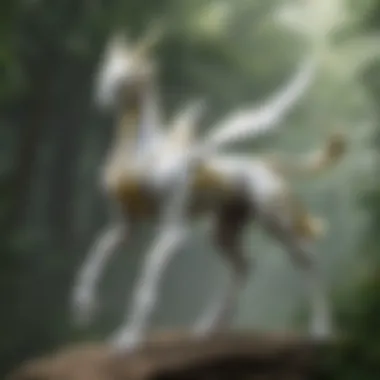

In essence, Arceus not only brings depth to gameplay but also catalyzes community interaction, enhancing the video game culture surrounding Pokémon.
Merchandising and Fan Reactions
The resonance of Arceus extends into merchandising and fan culture, where it has become a symbol of prestige and allure. From plush toys to figurines, the presence of Arceus in the marketplace highlights its popularity and the strong emotional connection fans have towards it. This connection is not merely about the end product but also involves the stories and experiences wrapped around these items.
Consider these points regarding merchandising and fan reactions:
- Diverse Products: There is a variety of merchandise featuring Arceus, including trading cards, clothing, and collectibles, which cater to a broad range of fans.
- Community Creations: Many fans engage in creating art, stories, and videos that center around Arceus, often showcasing their interpretation of the character within the Pokémon universe.
- Memorable Events: Special events often feature Arceus, including distribution events for rare in-game items, prompting excitement and fostering a sense of community among players who participate.
"Arceus has transcended its role as just a Pokémon; it's become a cultural icon that represents the exploration of creation and mythology within gaming."
The reactions and engagements from fans indicate a keen interest in the themes that Arceus embodies, reflecting a robust cultural impact that permeates beyond just gameplay.
In summary, Arceus’s cultural impact is profound, influencing not only how Pokémon is played and perceived but also the broader implications of storytelling in video games. This character continues to inspire conversations and creativity among fans, solidifying its place in both the Pokémon franchise and the realm of pop culture.
Arceus's Thematic Significance
Arceus stands as a monumental figure in the Pokémon universe, embodying the themes of creation and chaos in a uniquely profound way. As players delve into the lore surrounding this legendary Pokémon, they discover a rich tapestry that invites interpretations extending far beyond mere gameplay. Understanding the thematic significance of Arceus not only enriches one’s appreciation of the character, but it also provides valuable insights into the narrative structure of the Pokémon series as a whole.
At its core, Arceus represents the idea of a creator deity, tasked with the formation of the Pokémon world and its subsequent order. This positions Arceus as the centerpiece around which many myths and stories revolve, influencing not just Pokémon lore but the broader cultural narratives explored through the franchise. The contemplative nature of Arceus’s existence prompts examination of existential questions, such as the balance of good and evil, the concept of free will versus predestination, and the intricate relationship between chaos and harmony.
"In a universe filled with contradictions, Arceus serves as a reminder of the delicate equilibrium that exists between creation and destruction."
Exploring Themes of Creation and Chaos
The duality of creation and chaos is arguably the most defining aspect of Arceus’s thematic significance. On one hand, Arceus is hailed as the creator of the Pokémon world. This takes form through legends that describe Arceus as having shaped the very fabric of existence, giving rise to other significant Pokémon, like the creation trio: Dialga, Palkia, and Giratina. Each of these beings serves as a representation of time, space, and antimatter, respectively—elements that further emphasize the universe's complexity.
Conversely, chaos looms as an ever-present reality. Within Pokémon lore, the existence of evil, misfortune, and upheaval often stem from entities like Giratina, who embodies disorder itself. Therefore, Arceus's creation invites scrutiny on how harmony can be maintained amidst disorder. This theme resonates deeply, illustrating that creation is not simply about crafting a perfect world; it's also about managing the inevitable chaos that arises. This narrative creates a sense of depth, as trainers interact and engage with the Pokémon world fraught with both wonder and peril.
The Philosophy Behind Arceus's Existence
Delving into the philosophical underpinnings of Arceus’s existence opens avenues for profound discussions. The concept of a creator often comes with inquiries about the responsibility that accompanies such power. Arceus’s role comes with an expectation to maintain a balance, leading one to ponder whether it reflects a benevolent stewardship or a detached oversight.
The idea of free will is another philosophical thread woven into Arceus’s narrative. While it dictates the formation of the universe, it simultaneously allows Pokémon and trainers to forge their paths. This dynamic creates an intricate interaction between predestination and free will, posing the question—how much say do individuals have in a world governed by a deity?
In essence, Arceus stands as an archetype that bridges mythology and philosophy. For Pokémon fans navigating the series, contemplating these themes not only enhances their gameplay but also stimulates deeper intellectual engagement with the material. Discussing Arceus and its significance encourages players to reflect on larger human questions, making the experience richer and more rewarding.
By exploring Arceus through these thematic lenses, enthusiasts gain a layered understanding of this legendary Pokémon. The fusion of creation and chaos, coupled with its philosophical implications, positions Arceus not simply as a game mechanic, but as a nuanced and thought-provoking figure that sparks curiosity and wonder in the hearts of players.
End: The Legacy of Arceus
The tale of Arceus is woven deep into the fabric of Pokémon lore. It's not just a unique character; it's a symbol of the complexities associated with creation and existence across the Pokémon universe. The legacy of Arceus offers profound insights into the relationships among other Legendary Pokémon and the very essence of the Pokémon world itself, making it an essential topic for both casual players and dedicated enthusiasts.
The Enduring Appeal of Arceus in Pokémon Lore
Arceus's charm extends far beyond its awe-inspiring design. With its intriguing backstory, it has captured the imagination of fans from various backgrounds. Many players see Arceus as a part of their journey, oscillating between being a powerful ally and a mystical figure of myth.
Its ability to change types using Plates or Orbs showcases the flexibility and adaptability often desired by players. Also, Arceus's role as the "Original One" links it tightly to the essence of creation and mythology within the series. This duality makes it resonant in discussions about the deeper themes of life in the Pokémon world.
In terms of gameplay, Arceus's versatility is unmatched. Unlike traditional Pokémon that fall into fixed roles, this creature bridges gaps, offering players the chance to strategize against various opponents—essentially becoming what they need at any given moment. This factor has cemented its status as a fan favorite over the years.
Future Perspectives on Legendary Pokémon
Looking ahead, the evolution of Legendary Pokémon may take several exciting turns, influenced by what Arceus has established. The game's nature continues to evolve, driven by advances in technology and storytelling. It's safe to assume that future Legendary Pokémon will likely adopt some of Arceus's characteristics, further deepening the lore surrounding them.
Consider the potential for new generations of Pokémon to draw inspiration from Arceus's diverse nature. Will they too embody the traits of legendary guardians or creators? As the Pokémon universe expands with new game installments and regions, the question of how Arceus might influence future designs and stories is certainly intriguing.
"The legacy of Arceus establishes a foundation for future Legendary Pokémon, often reflecting various aspects of existence that resonate with players of all ages."
Thus, as we ponder about the future of Pokémon and its unfolding narrative, Arceus serves as a landmark—reminding us of the depth and creativity this world holds. The legacy of Arceus is not just stamped into history; it evolves, influencing the stories and creatures that will come after it.
